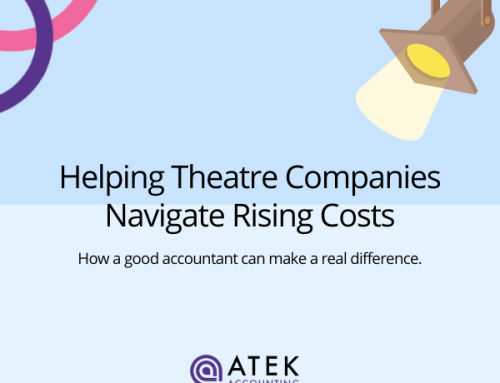
As an actor, your income can be unpredictable – so why pay more tax than necessary? Understanding your tax-deductible expenses can help you keep more of what you earn and invest it back into your career.
This guide offers an overview of tax-deductible expenses for actors and tips to simplify your financial management.
What Are Tax-Deductible Expenses?
Tax-deductible expenses are business costs that actors can claim to reduce their taxable income, which in turn lowers the amount of tax they need to pay.
These expenses must be both necessary and commonly associated with their profession. Here’s a detailed breakdown of what actors can claim as expenses.
What Can Actors Claim as Tax-Deductible Expenses?
Travel Expenses
Travel is an essential part of many acting careers, and the good news is that work-related travel expenses can often be deducted. This includes:
-
Public transport fares for travelling to auditions, rehearsals, performances, etc.
-
Mileage if you use your own vehicle, along with associated costs like fuel and maintenance.
-
Parking fees and tolls for work-related travel.
Commuting to your regular place of work is generally not deductible.
Tip: Keep a log of your trips, noting the dates, locations, and purposes to support your claims.
Costume and Makeup Expenses
Certain wardrobe and makeup costs are deductible if they are specifically required for your roles and not suitable for everyday wear. For example:
-
Custom costumes or period clothing for performances.
-
Stage makeup, wigs, or prosthetics required for a role.
However, general clothing, even if purchased for an audition, is typically not deductible unless it meets this criteria.
Tip: Keep receipts and detailed records for each purchase, noting its intended use.
Professional Training
Continuing to hone your craft is vital in the acting profession. Expenses for training directly related to your career are deductible, such as:
-
Acting workshops and courses.
-
Voice and dialect coaching.
-
Dance or movement classes relevant to your roles.
Agent Fees and Commissions
The cost of representation can add up, but the good news is that fees and commissions paid to your agent are fully deductible. This includes:
-
Annual retainer fees
-
Commissions
Accommodation Expenses
When your work takes you away from home, you can claim accommodation expenses. These could include:
-
Hotel stays while filming on location.
-
Temporary housing during a long show run or theatre production.
Remember, these expenses must be work-related and not for personal purposes.
Promotional Expenses
Promoting yourself is key to building your career. Deductible promotional expenses include:
-
Professional headshots and showreels.
-
Website creation and maintenance.
-
Membership fees (Spotlight, Equity, etc.)
Miscellaneous Expenses
Numerous smaller expenses add up and can also be deductible, such as:
-
Stationery and postage for work-related correspondence.
-
Mobile phone bills, if used for work-related calls.
-
Subscriptions to trade publications or acting resources.
Tip: Use a dedicated work mobile to simplify tracking of phone bills.
Food and Drink Expenses
While food and drink are typically considered personal expenses, there are exceptions, such as:
-
When travelling for work.
-
When working away from your usual place of business.
Industry Events and Film Festivals
Attending industry events can be vital for networking and career advancement. Deductible expenses might include:
-
Travel and accommodation for attending film festivals or award shows.
-
Entry fees for industry conferences or workshops.
Workshops and Conferences
Participating in workshops and conferences helps you stay current in the industry. Deductible expenses include:
-
Registration fees.
-
Materials provided as part of the event.
-
Travel and accommodation costs.
Self-Promotion Materials
Creating and distributing self-promotion materials is another tax-deductible area. This includes:
-
Business cards and promotional flyers.
-
Costs of advertising materials.
-
Headshots and showreels.
-
Website creation and maintenance.
Tips for Claiming Tax-Deductible Expenses
To make sure you’re getting the most out of your deductions and keeping in line with tax regulations, here are some steps to follow:
-
Use accounting software or a dedicated spreadsheet to track expenses that are tied to your acting career, such as costumes, travel, and professional fees.
-
Make sure to hold onto receipts and invoices to back up your expenses.
-
Group your expenses by category to make tracking easier.
-
Be sure you’re filling out the correct tax forms based on your business type.
-
Separate personal and business expenses (Only claim the part of your expenses that’s for business use.)
-
Consult a professional accountant to ensure you’re claiming all eligible expenses while staying compliant with tax laws.
Navigating Tax-Deductible Expenses
Tax regulations can be tricky to navigate, but Atek Accounting is here to help. We specialise in guiding actors and creatives to claim all eligible tax deductions while staying fully compliant.
By identifying and claiming these deductions, you can take control of your finances and focus on what you do best—acting!
If you have any questions or need further assistance, feel free to reach out. At Atek, we’re dedicated to supporting your creative journey.
More resources:













